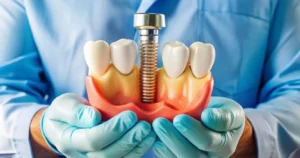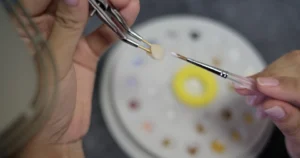Table of Contents
Do you get migraines, headaches, or jaw joint pain? These problems may disturb your routine, making concentrating on your career, family, and favorite activities difficult. When conventional approaches fail to offer sustained relief, many people become disappointed. It may surprise you to learn that stress or strained muscles around the head and neck are frequently the cause of tension headaches. At Luth & Heideman Center for Dental Care in Las Vegas, we understand the challenges of finding dependable relief for ongoing pain, especially when it might be linked to your TMJ (temporomandibular joint). If you have been searching for answers about tension headache relief, read on to discover how they develop and what you can do to feel better.
Below, we will explain common factors that lead to tension headaches, how stress can play a part, and practical methods to address symptoms. We will also share how our team, providing Tension Headache Care In Las Vegas, NV, may assist if your pain is linked to jaw function. Feeling in control of your health often starts with reliable information, and we hope this article offers a helpful place to begin.
Understanding Tension Headaches
Tension headaches are often described as mild to moderate pain that feels like tightness or pressure across the forehead or at the back of the head. Some people experience them occasionally, while others deal with frequent episodes. Although tension headaches are among the most widespread, many individuals still wonder why they occur.
- Muscle Strain: Poor posture or muscle fatigue can affect the head, neck, and shoulders. Pain may spread to the temples or forehead when these muscles tense, leading to a tension headache.
- Stress: Emotional or mental stress causes muscles in the shoulders and neck to tighten, which can bring on headache symptoms. Chronic stress may lead to recurring discomfort.
- TMJ-Related Issues: Problems with the temporomandibular joint can also strain facial and head muscles. Jaw clenching or grinding can contribute to the development of tension headaches.
While tension headaches are not usually dangerous, they can interfere with daily life. Many individuals seek chronic tension headache treatment options when the pain becomes persistent or disrupts quality of life.
Common Triggers for Tension Headaches
Identifying factors that set off tension headaches is a key step in prevention. Below are some frequent triggers:
- Prolonged Screen Time: Spending many hours hunched over a computer or phone can strain neck and shoulder muscles, leading to discomfort that becomes a headache.
- Lack of Sleep: Adequate rest is necessary for overall well-being. Missing out on sleep can increase stress levels and make the body more prone to headaches. Focusing on sleep and tension headache relief is an important part of a balanced routine.
- Dehydration: Not drinking enough water can trigger various symptoms, including headaches.
- Teeth Clenching: Unconscious clenching during the day or at night puts pressure on the jaw muscles and can worsen headache symptoms. A custom night guard may help reduce the strain.
- Extended Periods of Stress: Whether it’s related to work or personal challenges, stress can tighten upper body muscles, leading to tension headaches that recur over time.
Understanding these triggers helps when discussing how to relieve a tension headache with a healthcare professional or exploring at-home methods.
Techniques and Tools to Find Relief
If you have ever asked yourself, “What can I do for tension headache relief? Consider a few proven methods:
- Relaxation Exercises: Deep breathing and gentle neck stretches reduce muscle tightness in the upper body. Consistency in these simple exercises may lower the frequency of headaches.
- Massage Therapy: A licensed massage therapist can work on tense shoulder and neck muscles, often bringing noticeable relief.
- Mindfulness or Meditation: Taking a few moments each day to clear your head and focus on breathing can lower stress levels and decrease the likelihood of tension headaches.
- Hydration: Keep a water bottle within reach throughout the day to encourage sufficient fluid intake. This helps support normal body functions, including muscle health.
These approaches can be a good starting point for those seeking natural remedies for tension headaches. However, certain cases require more specific therapies. At Luth & Heideman Center for Dental Care, we use methods like Nociceptive Trigeminal Inhibition (NTI), Needling and trigger pointninjections, Xeomin Botox®, Night Guard (including Soft Night Guard and Hard Night Guard), Cyclobenzaprine (Flexeril), and Doppler Auscultation (ultrasound) of TMJ to address TMJ-related problems that may contribute to tension headaches.
Exploring Long-Term Solutions
When headaches persist or occur frequently, it may be time for a comprehensive evaluation. Chronic tension headache treatment can involve strategies to manage stress, improve posture, and lessen muscle tension around the jaw. A thorough temporomandibular joint and bite alignment check can reveal underlying issues.
- Jaw Health and Dental Care: If your headaches stem from TMJ concerns, our team can suggest interventions that address the root causes. Solutions may include professional bite analysis, fitting of a night guard, or specialized therapies to relax the jaw muscles.
- Lifestyle Adjustments: Reducing sources of stress, adopting healthy sleep habits, and scheduling regular exercise can help reduce both the frequency and severity of tension headaches.
- Yoga for Tension Headaches: Mild stretching poses in yoga improve posture and circulation. Practicing basic poses encourages relaxation, which may lessen the chances of developing a tension headache.
When to Seek Professional Help
Sometimes, at-home techniques are not enough. If headaches become severe and frequent or are accompanied by additional symptoms like jaw pain or difficulty chewing, it may be time to consult a professional. Our practice, known for tension headache care in Las Vegas, NV, has worked with patients dealing with stubborn headaches that do not resolve independently.
We understand that managing headaches and potential TMJ dysfunction is about more than just reducing pain—it’s about restoring comfort in everyday activities. Our services include various treatment options tailored to each patient, allowing many to experience meaningful improvement. With our team at Luth & Heideman Center for Dental Care in Las Vegas, you no longer have to plan multiple trips to complete essential dental care; we can often handle everything in one sitting.
Conclusion
Tension headaches develop from several sources, including muscle strain, stress, and issues with the temporomandibular joint. Addressing these concerns with the right combination of lifestyle changes and targeted therapies often relieves tension headaches. Whether you are investigating natural remedies for tension headaches or require professional support for chronic tension headache treatment, know that help is available.
If you suspect your headaches may be related to TMJ problems, it is crucial to work with a provider who can identify the root cause. By focusing on prevention, daily habits, and specialized treatments—such as Nociceptive Trigeminal Inhibition (NTI) or Xeomin Botox®—you can reduce discomfort and achieve a better overall quality of life.
Contact Luth & Heideman Center for Dental Care in Las Vegas for an evaluation and to learn more about how our practice can support your well-being. Contact us today to start your journey to pain-free living. We look forward to helping you find a healthier, more comfortable future.






